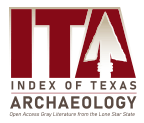Home > Research Projects and Centers > Center for Regional Heritage Research > Index of Texas Archaeology > Vol.
Article Title
Agency
Texas Historical Commission
Abstract
At the request of the San Antonio Water System (SAWS), an intensive archaeological survey was conducted by Pape-Dawson for the proposed Masterson Road water line project located southwest of the City of San Antonio in Bexar County, Texas. The project area’s southern terminus is 6,560 feet (ft) (2,000 meters [m]) south of U.S. Highway 90 (US 90), and the linear project area extends north along Masterson Road for about 2,904 ft (885 m) before turning east and northeast along a proposed new road (Copper Crossing Street), for a total length of 6,726 ft (2,050 m). The proposed water line will be bored beneath Masterson Road where it crosses the roadway. The water line will be installed adjacent to the western side of Masterson Road within a permanent 16-ft-wide (12.2-m-wide) utility easement. The project area will also include a temporary 20-ft-wide (6.1-m-wide) construction easement that will parallel the permanent easement.
Based on SAWS’ status as a political subdivision of the State of Texas, compliance with the Antiquities Code of Texas (ACT) is required. Since the project will require a 404 permit from the United States Army Corps of Enginers (USACE), compliance with Section 106 of the National Historic Preservation Act (NHPA) is also necessary.
For the purpose of the project, the area of potential effects (APE) is defined as the footprint of the proposed water and temporary construction easements. The APE will consist of a total area of 5.48 acres (2.22 hectares). The depth of vertical impacts has not yet been determined, but the maximum vertical depth of impact is considered to be up to 8 ft (2.4 m) below the current ground surface within the permanent easement based on typical utility installations, except at the bore locations where impacts may be up to 40 ft (12.2 m) beneath the ground surface. Ground disturbance within the temporary construction easement will be minimal and should not exceed 1 ft (30 centimeters [cm]) below the current ground surface.
Pape-Dawson conducted an archaeological survey for the Masterson Road project on March 6, 2018. This work was conducted under Texas Antiquities Permit No. 8252. The APE was subjected to a pedestrian survey with shovel testing with the exception of six parcels that could not be accessed because right-of-entry had not been obtained at the time of the survey. Archaeologist documented these parcels from the ROW during the survy. A total of 11 shovel tests were excavated to investigate the APE resulting in the recordation of one new archaeological site (41BX2228).
Site 41BX2228 is a surficial prehistoric lithic scatter of indeterminate temporal affiliation. Given the absence of diagnostic material and/or features, and the lack of subsurface deposits, Pape-Dawson recommends that site 41BX2228 is not eligible for NRHP listing or for SAL designation.
Based on the results of the survey, Pape-Dawson recommends that no further archaeological work is necessary for the surveyed portion of the APE. However, given the poor ground surface visibility at the time of the survey, Pape-Dawson does recommend that the 6 unsurveyed parcels be subjected to an intensive pedestrian survey once right-of-entry has been granted. Within the entire APE, if undiscovered cultural material is encountered during construction, it is recommended that all work in the vicinity should cease and that the discovery be evaluated by a qualified archaeologist who can provide guidance on how to proceed in accordance with state regulations.
Creative Commons License

This work is licensed under a Creative Commons Attribution-NonCommercial 4.0 International License
Included in
American Material Culture Commons, Archaeological Anthropology Commons, Environmental Studies Commons, Other American Studies Commons, Other Arts and Humanities Commons, Other History of Art, Architecture, and Archaeology Commons, United States History Commons
Submission Location
Tell us how this article helped you.


